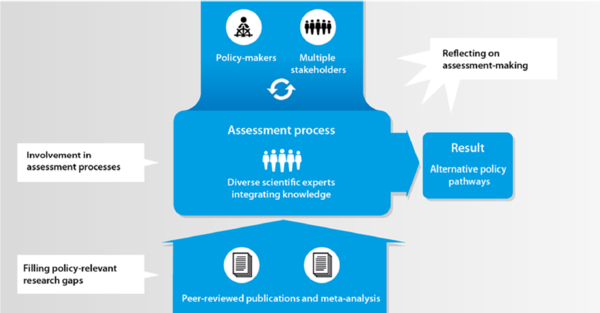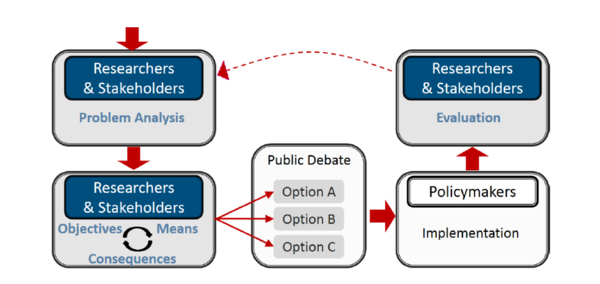Contents
> The problem: Short-sighted decision-making
> The challenge: Exploring policy paths
> Our contribution: Policy-relevant research and assessments
The problem: Short-sighted decision-making
Governments and other stakeholders often have a short-term and national focus. Climate protection and sustainable development, however, are fairly long-term and highly complex, interlinked issues. An example: Limiting the rise of the global temperature may require the use of biomass at an unprecedented scale to produce clean energy. This, in turn, could lead to increased deforestation, increasing food prices and the loss of biodiversity. Such diverse consequences and complex tradeoffs or synergies call on policymakers, and society as a whole, to reevaluate available options and policies or even to justify the political objectives once again. Here, the scientific community has a crucial role to play in promoting and informing the discourse on global and long-term problems, available options, and their diverse practical implications.
The challenge: Exploring policy paths
To foster rational, deliberative and democratic decision-making under these circumstances, continuous communication is needed between society, scientific experts and policymakers. Instead of narrowing the public debate, experts must explore different avenues on issues with far-reaching implications. They should map out various courses of action by showing and clarifying the available options. In light of their practical implications, these options then need to be revised in a social learning process without experts steering toward any one political decision. In other words, scientists show the opportunities and risks of feasible paths in policy, while recognizing that the navigation must come from the decision-makers. This challenging exploration of policy pathways can best be realized in scientific assessments.
Key characteristics of such large-scale assessments are (see blue parts of the figure below):
- Peer-reviewed publications and meta-analysis as the basis of large-scale assessments (bottom)
- Diverse scientific experts integrating knowledge across different disciplines, assumptions and policy aspects (middle)
- Policy-makers and multiple stakeholders to explore the diversity of values, concerns, viewpoints and expertise in a transparent and iterative manner at various stages of the assessment process (top)
- the assessment process itself in which scientists, policymakers and other stakeholders deliberate alternative policy options and pathways and their various implications, making controversies and uncertainty transparent (middle)
- the result, i.e. alternative policy pathways that should be publicly available and present different policy options or measures, together with their various implications in terms of risks, costs and opportunities (right).

Figure 3: Key characteristics of assessments and the MCC’s contribution (Source: adapted from Kowarsch 2015, Nature Climate Change)
To ensure credibility, legitimacy and relevance of such scientific assessments, our scientific policy advice at MCC is guided by a specifically developed science-policy model that regards the transformation towards sustainability as an iterative learning process between scientific experts, decision-makers and society. This Pragmatic-Enlightened Model (PEM) claims that a joint exploration of alternative policy options and their implications in integrated scientific assessments is required to make social conflicts, synergies and uncertainties transparent and to identify viable policy solutions (see figure).

Figure 4: The Pragmatic-Enlightened Model (Source: Edenhofer and Kowarsch 2015, Environmental Science and Policy)
The PEM suggests that after researchers and stakeholders have jointly framed the problem (upper left box in the figure), they explore the objectives, means and consequences (lower left). The two white boxes (middle, lower right) indicate steps in the policy process that are outside the assessment-process per se, such as public debate on alternative policy pathways, as well as policy decisions and implementation by policymakers. Finally, there is a scientific ex-post evaluation of the actual means-consequences (upper right), which is also the starting point for a new assessment cycle.
Our contribution: Policy-relevant research and assessments
MCC aims to provide the best available scientific knowledge, supporting the decision-making process, and to shape debates both in scientific arenas (e.g. within economics and social science research) and public policy discussions (e.g. in the reform process of the European Emissions Trading Scheme (EU-ETS) or in combining rent taxation and public finance reform). MCC gives non-policy prescriptive advice to target audiences that include decision-makers in international organizations, parliaments, public administration and other stakeholders from business and NGOs.
MCC contributes to assessment making by filling policy-relevant research gaps, being involved in assessment processes, and reflecting on assessment making (see white parts of the first figure above):
- Filling policy-relevant research gaps: MCC publishes its research on policy-relevant research gaps and on specific policy pathways in high-level, interdisciplinary journals such as Science, Nature or PNAS and in disciplinary journals, e.g. in economics or environmental sciences.
- Involvement in assessment processes: MCC is directly and actively involved in large-scale, international and formalized assessment processes such as those carried out by the Intergovernmental Panel on Climate Change (IPCC) and the International Panel on Social Progress (IPSP). MCC staff also initiated a pilot assessment on the reform of the European Emissions Trading Scheme (EU-ETS) and participates in informal science-policy processes via interactions with high-level stakeholders and institutions.
- Reflecting on assessment making: MCC systematically reflects on existing processes of scientific policy advice and assessment making (on the design, formats and content), and it advises relevant institutions on improving them. For instance, MCC substantially contributed to the debate about IPCC reform in multiple ways.
Combining these three contributions to assessment making distinguishes MCC in both the German and international research communities that address climate change and sustainable development. Other institutes usually focus on a sub-set of these assessment contributions, but very few on their combination.
Read more about our work in major contributions.





